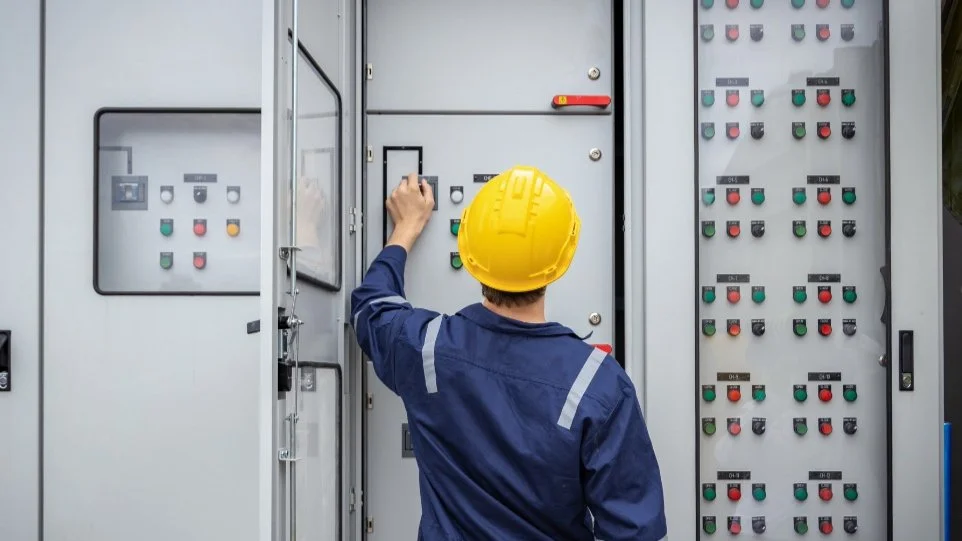Planned Preventative Maintenance (PPMs) for Commercial Buildings: Why It Matters
When it comes to managing a commercial property, Planned Preventative Maintenance (often referred to as PPMs) isn’t just a good idea—it’s essential. Without it, you risk unexpected failures, costly repairs, and non-compliance with UK safety regulations.
In this guide, we’ll explore why PPMs are essential for commercial building safety, what’s included in a planned maintenance checklist for electrical systems, and how to get reliable PPM services in Oxfordshire.
What Is Planned Preventative Maintenance?
Planned Preventative Maintenance refers to the scheduled, proactive servicing of a building’s critical systems—before faults occur. It’s the opposite of reactive maintenance, which only addresses issues after they arise.
It is a formal agreement between an electrical contractor and either a facilities management team or a business directly. The contract outlines the scope of work, agreed responsibilities, associated costs, and the schedule for when the work will be carried out. For example, the contractor may conduct a monthly emergency lighting flick test and then an annual full 3-hour battery discharge test. All results are recorded, and any issues identified are reported to the facilities team, with further remedial work agreed upon as necessary.
PPM packages typically includes:
Regular inspections of electrical and fire systems
Safety testing
Performance and functional checks
Early repairs and upgrades
By identifying issues early, PPM reduces downtime, improves safety, and helps you plan maintenance costs more effectively.
Why PPM Is Essential for Commercial Building Safety
From electrical faults to fire safety risks, failing to maintain your systems puts people and property at risk. Here’s why every commercial property should have a robust PPM schedule:
1. Improved Safety
PPM ensures your electrical systems, lighting, fire alarms, and emergency equipment are functioning correctly—helping to prevent incidents before they happen.
2. Legal Compliance
Businesses in the UK must comply with various regulations, including the Electricity at Work Regulations 1989 and BS 7671 Wiring Regulations. Regular maintenance helps ensure you meet legal responsibilities.
3. Minimised Downtime
A well-maintained building runs more smoothly. PPM helps avoid unexpected system failures that could disrupt operations or force temporary closures.
4. Cost Control
Catching faults early often means smaller, cheaper repairs—rather than large-scale fixes or full system replacements.
5. Insurance & Audit Readiness
Up-to-date maintenance records are often required for insurance claims and health and safety audits. PPM ensures you're always prepared.
6. Predictability
With contracted maintenance schedules in place, your business can reliably forecast maintenance costs, reducing the risk of unexpected expenses. This predictability allows for more effective budgeting and long-term planning. While PPM doesn't eliminate all potential issues, it helps identify and address most problems before they escalate, significantly lowering the likelihood of sudden failures or safety risks.
Planned Maintenance Checklist for Electrical Systems
When setting up a planned maintenance checklist for electrical systems, focus on the key components that affect safety and performance:
Distribution boards – check for overheating, damage, and loose connections
Emergency lighting systems – monthly tests and annual 3-hour duration tests
Fire alarm systems – weekly or monthly tests and annual testing for full functionality
RCDs and circuit breakers – inspect for tripping functionality and response time
Lighting controls – inspect DALI or PLC-based systems for faults, software and firmware updates
Fixed wiring – tested maximum every 5 years through an EICR (Electrical Installation Condition Report) typically 1 year for visual inspections
Portable appliances – PAT testing at intervals based on risk - 1 year for a typical office environment
Data cabling and comms equipment – inspect for overheating and performance issues
PPM can be tailored to suit the unique demands of your property and business type.
Who Needs PPM Services in the UK?
If you manage or own a:
🏢 Commercial office
🏬 Retail space
🏭 Industrial facility
🏫 School or university
🏨 Hotel or hospitality venue
🏥 Healthcare or care home setting
...then PPM services are a must to protect your staff, customers, and investment.
Why Choose Carter’s Electrical Services?
At Carter’s Electrical Services, we deliver trusted, fully tailored PPM services across Oxfordshire and surrounding areas. Our commercial maintenance plans are designed to keep your systems safe, compliant, and running smoothly—all while helping you avoid costly surprises.
We provide:
Regular inspection and maintenance visits
Detailed service reports and certification
Flexible scheduling to suit your business hours
Emergency call-out support
📞 Get in touch today to arrange a PPM package built around your property’s needs.
Frequently Asked Questions
-
PPM helps prevent equipment failure and safety risks by regularly checking and maintaining building systems before issues arise.
-
It ensures legal compliance, improves safety, reduces downtime, and lowers long-term costs by catching problems early and allowing budgeting and forecasting to be more accurate.
-
Frequency depends on the system, but many services (e.g., emergency lighting or fire alarms) require monthly and annual checks, while EICRs are typically required every 5 years.
-
It includes checks of distribution boards, lighting, emergency systems, circuit protection, fixed wiring, PAT testing, fire detection systems and more.
-
Responsibility for Planned Preventative Maintenance (PPM) in a commercial property typically falls to the property owner, landlord, or facilities manager. They are accountable for ensuring that maintenance is carried out regularly and properly documented. However, tenants also have a responsibility to ensure a safe environment for their staff and can raise concerns with the landlord if PPM is lacking or overdue.

